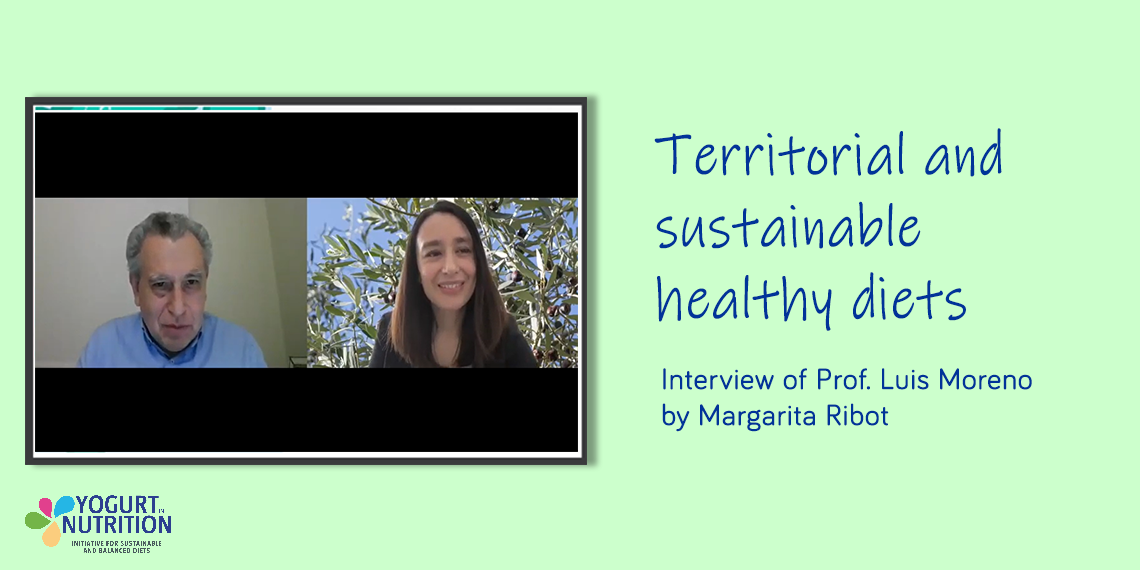Luis A. Moreno is Professor of Public Health at the University of Zaragoza (Spain). He is the co-author of a recent publication “Territorial and sustainable healthy diets” published in the Food and Nutrition Bulletin. Margarita Ribot asked him to develop about this publication and the place of territorial and sustainable healthy diets.
Mediterranean Diet and New Nordic Diet : territorial diets
The Mediterranean Diet and the New Nordic Diet, as territorial diets, have been shown as potentially capable of reversing these trends by positively contributing to the health of people and the environment.
The Mediterranean Diet (MD) became known as a healthy diet in the early 1960s. This was thanks to the work of Ancel Keys who showed the protective effects of the diets eaten in Southern Europe in the Mediterranean Sea against coronary heart disease (1). The Mediterranean Diet is a diet with high consumption of whole cereals, legumes, vegetables, fruits, nuts and olive oil, a low to mild consumption of dairy products, and a low consumption of meat and poultry(2).
The New Nordic Diet (NND) is a new constructed diet built with strong anchorage onto the Nordic food traditions. This diet positively contributes to both health and the environment. The NND was launched in 2004 by a group of reputable chefs from the Nordic region. With the incorporation of concerns for environmental sustainability and planetary health they embarked on rediscovering local produce(3).
Health benefits of territorial diets
The health benefits of the selected territorial diets are clear. Adherence to the Mediterranean Diet has been associated with a significant reduction in total mortality, mortality from cardiovascular disease (CVD) and cancer, and with cancer-risk lowering potential(2,4,5).
The “Prevención con Dieta Mediterránea (PREDIMED)” study(6) shows that the relationship between the Mediterranean Diet and positive health outcomes is abundant. Also there is a recent review1 that has confirmed the favorable influences of the Mediterranean Diet on the risk for metabolic syndrome, obesity, type 2 diabetes mellitus, cancer, and neurodegenerative diseases.
The evidence of the New Nordic Diet health benefits is less abundant than those of the Mediterranean Diet. The NND benefits from a well-established and substantial evidence of health-promoting properties(7). The health outcomes of the NND show an inverse relationship with several cardiovascular risk factors (8), abdominal obesity(9), body fat(10), inflammatory markers and serum lipids(11),colorectal cancer risk(12),and total mortality(13). There are also some studies about the NND that have shown an inverse association with the risk of type 2 diabetes(13), and also it improves blood pressure, cholesterol, and triglycerides in comparison to a control diet (14).
Sustainable Diets
The FAO gave a definition to sustainable diets as: “Those diets with low environmental impact which contribute to food and nutrition security and to healthy life for present and future generations. Sustainable diets are protective and respectful of bio-diversity and ecosystems, culturally acceptable, accessible, economically fair and affordable; nutritionally adequate, safe and healthy; while optimizing natural and human resources”(15).
For assessing the sustainability of diets, we need to consider the 3 dimensions of sustainability: environmental, social, and economic. Environmental footprints are pressure indicators. A study for the Mediterranean Diet assessed water footprints (WF) to food consumption for the current diet and 3 diet scenarios: Mediterranean Diet including meat, pescetarian, and vegetarian. A Mediterranean Diet leads to WF reductions of 19% to 43% with respect to the current diet. A pescetarian and vegetarian diet scenarios lead to WF reductions of 28% to 52% and 30% to 53%, respectively (16).
Another group of researchers(17) found that following the Mediterranean Diet in Spain would reduce greenhouse gas emissions by 72%, land use by 58%, energy consumption 52%, and to lower extent water consumption by 33%. There is also another study(18) that estimated that the shift from a modern Italian diet to a Mediterranean Diet would reduce the carbon footprint by 30%, the ecological footprint by 24%, and the WF by 18%.
The New Nordic Diet (NND) is associated with lower environmental pressures. A study(19) evaluated the environmental impact of the Average Danish Diet (ADD) and the NND. By choosing the NND it results in a cost saving of 32% of the overall environmental cost of 835 €/person/year associated with the ADD. This reduction is caused by a reduction in meat consumption favoring higher quality meat consumption and less imported foods from long distance.
Adherence to the Mediterranean Diet & the New Nordic Diet
The Mediterranean Diet popularity has increased worldwide, but in the Mediterranean region it has decreased. Researchers(20) indicate that this decline is due to increasing urbanization and globalization, the development of mass food culture, the relative prosperity of the developed and developing Mediterranean countries, and the change of family structure, with the consequent break of the traditional way of transmitting culinary know-how. As per the NND it is early to make any conclusion since it has been created very recently.
Challenges & recommendations
We live in a world where demographic, economic, cultural, and nutritional changes happen rapidly and all of this is within limited global natural resources. In order to maintain such changes and feed the population for better health outcomes, most of the territorial diets can perform in a good way because they have low environmental pressures and impacts as well as a positive health and nutritional outcome like is the case of the Mediterranean Diet and the New Nordic Diet.
A study was conducted in Spain(21) in 2019 to examine the cost of 3 dietary patterns, and the results showed that in terms of affordability, the Western dietary pattern was the most affordable while the Mediterranean Diet pattern was the most expensive. Adding to the economic cost of diets there are some elements that are usually forgotten but are very significant for sustainability such as taste, preference, convenience, and practicality. It is a difficult task to support the dimensions of sustainability and it is important to find diets that support those different elements.
There are also aspects related to palatability and gastronomic potential of diets that have to be considered when addressing the issue of healthy and sustainable diets. In countries where huge inequalities and low capacities exist, it is a challenge to collect the data needed.
Conclusion
It is important to understand what drives the consumers to make their choices. And it is also important to understand what people think of sustainable healthy diets. Policy makers should contribute to the transformation of food systems for better health and sustainability. In my opinion it would be necessary to educate the population about what are healthy and sustainable diets.

Luis A. Moreno is Professor of Public Health at the University of Zaragoza (Spain). He is also Visiting Professor of Excellence at the University of Sao Paulo (Brazil).
 Margarita Ribot is a Nutrition & Health Coach currently completing an MSc in Food, Nutrition & Health at University College Dublin to become a Registered Nutritionist. She had the honor to speak at the United Nations headquarter in New York for the official launch of World Pulses Day and she is considered a key food and health influencer of the European Union by EUFIC. Her blog, Tasty Mediterraneo, is an award wining health blog. And she writes her blog in 4 languages: English, French, Spanish and Arabic.
Margarita Ribot is a Nutrition & Health Coach currently completing an MSc in Food, Nutrition & Health at University College Dublin to become a Registered Nutritionist. She had the honor to speak at the United Nations headquarter in New York for the official launch of World Pulses Day and she is considered a key food and health influencer of the European Union by EUFIC. Her blog, Tasty Mediterraneo, is an award wining health blog. And she writes her blog in 4 languages: English, French, Spanish and Arabic.
- Blog: https://www.tastymediterraneo.com/
- Instagram: https://www.instagram.com/tastymediterraneo/
- Twitter: https://twitter.com/TastyMditrraneo
- Facebook: https://www.facebook.com/TastyMediterraneo
- Pinterest: https://www.pinterest.com/tastymditrraneo/
References
-
Lacatusu CM, Grigorescu ED, Floria M, Onofriescu A, Mihai BM. The Mediterranean diet: from an environment-driven food culture to an emerging medical prescription. Int J Environ Res Public Health. 2019;16(6):942. doi:10.3390/ijerph16060942
-
Trichopoulou A, Corella D, Martínez-González MA, Soriguer F, Ordovas JM. The Mediterranean diet and cardiovascular epidemiology. Nutr Rev. 2006; 64(s4):S13- S19. doi:10.1301/nr.2006.oct.S13-S19
-
Byrkjeflot H, Pedersen JS, Svejenova S. From label to practice: the process of creating new Nordic cuisine. J Culin Sci Technol. 2013;11(1): 36-55. doi:10.1080/15428052.2013.754296
-
Trichopoulou A, Costacou T, Bamia C, Trichopoulos D. Adherence to a Mediterranean diet and survival in a Greek population. N Engl J Med. 2003; 348(26):2599-2608. doi:10.1056/NEJMoa025039
-
Sofi F, Abbate R, Gensini GF, Casini A. Accruing evidence on benefits of adherence to the Mediterranean diet on health: an updated systematic review and metaanalysis 1, 2. 2010;92(5):1189-1196. doi: 10.3945/ajcn.2010.29673
-
Valls-Pedret C, Sala-Vila A, Serra-Mir M, et al. Mediterranean diet and age-related cognitive decline: a randomized clinical trial. JAMA Intern Med. 2015;175(7):1094-1103. doi:10.1001/ jamainternmed.2015.1668
-
Mithril C, Dragsted LO, Meyer C, Tetens I, Biltoft-Jensen A, Astrup A. Dietary composition and nutrient content of the New Nordic diet. Public Health Nutr. 2012;16(5):777-785. doi:10.1017/ S1368980012004521
-
Adamsson V, Reumark A, Fredriksson IB, et al. Effects of a healthy Nordic diet on cardiovascular risk factors in hypercholesterolaemic subjects: a randomized controlled trial (NORDIET). J Intern Med. 2011;269(2):150-159. doi:10.1111/j.1365- 2796.2010.02290.x
-
Kanerva N, Kaartinen NE, Schwab U, Lahti-Koski M, Mannisto S. Adherence to the Baltic Sea diet consumed in the Nordic countries is associated with lower abdominal obesity. Br J Nutr. 2013;109(3): 520-528. doi:10.1017/S0007114512001262
-
Kanerva N, Kaartinen NE, Ovaskainen M, Konttinen H. A diet following Finnish nutrition recommendations does not contribute to the current epidemic of obesity. Public Health Nutr. 2013;16(5):786-794. doi:10.1017/S1368980012005356
-
Uusitupa M, Hermansen K, Savolainen MJ, et al. Effects of an isocaloric healthy Nordic diet on insulin sensitivity, lipid profile and inflammation markers in metabolic syndrome—a randomized study (SYSDIET). J Intern Med. 2013;274(1):52-66. doi:10.1111/joim.12044
-
Kyro C, Skeie G, Loft S, et al. Adherence to a healthy Nordic food index is associated with a lower incidence of colorectal cancer in women: the diet, cancer and health cohort study. Br J Nutr. 2013; 109(5):920-927. doi:10.1017/S0007114512002085
-
Olsen A, Egeberg R, Halkjær J, Christensen J, Overvad K, Tjønneland A. Healthy aspects of the Nordic diet are related to lower total mortality. J Nutr. 2011;141(4):639-644. doi:10.3945/jn.110.131375
-
Lacoppidan SA, Kyrø C, Loft S, et al. Adherence to a healthy Nordic food index is associated with a lower risk of type-2 diabetes—the Danish diet, cancer and health cohort study. Nutrients. 2015; 7(10):8633-8644. doi:10.3390/nu7105418
-
Auestad N, Fulgoni VL. What current literature tells us about sustainable diets: emerging research linking dietary patterns, environmental sustain- ability, and economics. Adv Nutr. 2015;6(1): 19-36. doi:10.3945/an.114.005694 _
-
Vanham D, del Pozo S, Pekcan AG, Keinan-Boker L, Trichopoulou A, Gawlik BM. Water consumption related to different diets in Mediterranean cities. Sci Total Environ.2016;573:96-105. doi: 10.1016/j.scitotenv.2016.08.111
-
Sáez-Almendros S, Obrador B, Bach-Faig A, Serra- Majem L. Environmental footprints of Mediterranean versus Western dietary patterns: beyond the health benefits of the Mediterranean diet. Environ Heal. 2013;12(1):118. doi:10.1186/1476-069x-12-118
-
Germani A, Vitiello V, Giusti AM, Pinto A, Donini LM, del Balzo V. Environmental and economic sustainability of the Mediterranean diet. Int J Food Sci Nutr. 2014;65(8):1008-1012. doi:10. 3109/09637486.2014.945152 _
-
Saxe H. The New Nordic diet is an effective tool in environmental protection: it reduces the associated socioeconomic cost of diets. Am J Clin Nutr. 2014;99(5):1117-1125. _
-
Hachem F, Capone R, Yannakoulia M, Dernini S, Hwalla N, Kalaitzidis C.The Mediterranean diet: a sustainable food consumption pattern. In: Mediterra 2016. Zero Waste in the Mediterranean. Presses de Sciences Po, Paris; 2016. _
-
Fresán U, Martínez-González MA, Sabate J. Global sustainability (health, environment and monetary costs) of three dietary patterns: results from a Spanish cohort (the SUN project). BMJ Open. 2019;9(2):e021541. doi:10.1136/bmjopen-2018- 021541



